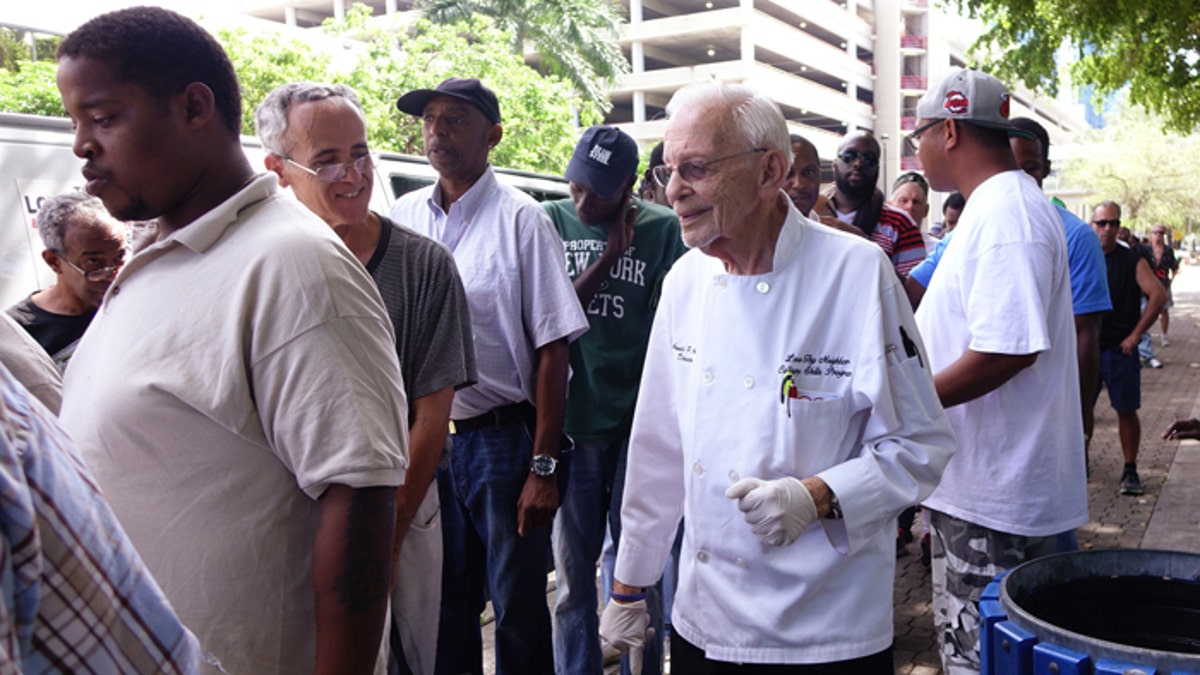
Arnold Abbott plans to defy Fort Lauderdale's ordinance against feeding the homeless again on Wednesday. (Courtesy: Sun-Sentinel)
Fort Lauderdale police say Arnold Abbott violated a new city law, but the 90-year-old homeless advocate says his only crime was to “love thy neighbor.”
Abbott was charged Sunday along with two local pastors with violating the city’s new ordinance that effectively bans giving out food in public. He faces 60 days in jail and a $500 fine, and he intends to get cited again Wednesday night, when he sets out to feed some of the Florida city’s estimated 10,000 homeless on a public beach.
[pullquote]
“I know that I will be arrested again, and I am prepared for that,” Abbott said by phone from his office at Love Thy Neighbor, Inc., a nonprofit he established in honor of his wife, Maureen, after her death in a car accident 23 years ago. “I am my brother’s keeper, and what they are doing is just heartless.”
Fort Lauderdale passed an ordinance late last month that included a slate of new regulations on where and how groups can provide food to homeless people. The vote made the city the 13th in the nation since 2012 to pass restrictions on where people can feed the homeless, according to a report by the National Coalition for the Homeless.
The regulations enacted in Fort Lauderdale state that no two indoor feeding sites can be within 500 feet of one another or on the same block; outdoor feeding programs require a permit or permission of the property owner and must provide portable toilets; and outdoor stations cannot be within 500 feet of residential properties.
Abbott, whose charity has battled city officials for years in court and on the streets of the southern Florida city, said the toilet requirement was too much for his group.
“I have tried to abide by their regulations, but we just are not able to provide a port-a-potty,” he said. “I believe that is the job of the municipality, anyway.”
Cited along with Abbott were Dwayne Black, pastor of The Sanctuary Church in Fort Lauderdale, and Mark Sims of St. Mary Magdalene Episcopal Church in Coral Springs, according to the Fort Lauderdale Sun-Sentinel. Although the three were not handcuffed or taken to jail, they were cited and must appear in court or face a bench warrant.
Fort Lauderdale officials defended the ordinance, saying it does not bar people from helping the hungry.
"The ordinance allows for legal, clean and safe distribution of food to the homeless," said Fort Lauderdale Police Department Det. DeAnna Greenlaw. "For example, if a minister, priest or member of clergy wishes to provide food to the homeless at their establishment (I.e community hall, church or gathering place) they can do so if the proper facilities, as listed in the ordinance, are in place."
[youtube 5L1bv5AQ9L4]
Supporters of the strict laws say that allowing programs like Abbott’s encourages homelessness. Cal Deal, a 65-year-old former journalist who videotapes homeless people in the city and says they commit crimes, cause sanitation problems and need more help than simply food.
"The people feeding them are enablers, and they enable the homeless by making their lives easier," Deal told the New Times of Broward County. "Hunger is a big motivator. Are people more likely to seek help when they're hungry or when they're fed and happy?"
Ron Book, chairman of the Miami-Dade County Homeless Trust, told city lawmakers at the raucous, Oct. 21 meeting at which the new laws were passed that they would have a positive effect.
"Feeding people on the streets is sanctioning homelessness," Book said. "Whatever discourages feeding people on the streets is a positive thing."
Sims acknowledged that Fort Lauderdale has a problem with homelessness, but said the answer isn't laws that make it hard to feed people.
"It's not an easy issue, not cut and dried," Sims said. "But what is cut and dried is that people deserve to eat when they are hungry. And people of faith are compelled to reach out to people who are in need.
"We need to work harder to solve the problem, rather than just shutting it down,” he added.
Abbott said there is a simple explanation for Fort Lauderdale's outsize homeless population.
“The homeless people come here for the weather,” he said. “They know they won’t freeze to death in Fort Lauderdale.”
Abbott, a World War II veteran who won two Purple Hearts as an infantryman, said he won’t stop the fight he has dedicated to his wife.
“She tried to help as many poor and homeless people as she could,” said Abbott, a retired jewelry salesman who grew up in Philadelphia. “When I lost her, I decided the best tribute to her would be a full-time program in her name.”
In addition to feeding the homeless, Love Thy Neighbor operates a culinary training program that Abbott says has helped more than 400 people learn food service skills.
But the food programs have gotten him in trouble for years. In 1999, the city tried to stop Abbott from feeding the homeless on Fort Lauderdale Beach, the same location he plans to go to Wednesday. Abbott sued and won, and says he will go back to court if necessary.
"I’ll go to court again and sue the city," said Abbott. "They are doing the bidding of the very wealthy, and they are trying to sweep the poorest of the poor under the rug.”












































